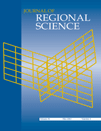
JOURNAL OF REGIONAL SCIENCE
Scope & Guideline
Unveiling Critical Studies in Regional Science and Development
Introduction
Aims and Scopes
- Regional Economic Development:
The journal emphasizes understanding the dynamics of regional economic growth, including the factors that drive disparities in development across regions. - Spatial Analysis and Modeling:
Utilizing advanced statistical and econometric models, the journal publishes research that explores spatial relationships and the impact of location on economic and social outcomes. - Social and Environmental Interactions:
Research that investigates the interplay between social factors (such as inequality and migration) and environmental challenges (like climate change) is a core focus of the journal. - Policy Implications and Evaluations:
The journal seeks to bridge academic research with practical applications, providing insights into the effectiveness of policy interventions at local, regional, and national levels. - Interdisciplinary Approaches:
Encouraging contributions from various fields, the journal welcomes interdisciplinary research that integrates insights from economics, sociology, geography, and urban studies.
Trending and Emerging
- Climate Change and Regional Impact:
Research linking climate change to regional economic outcomes has surged, highlighting the urgency of understanding environmental risks and their socio-economic implications. - Digital Transformation and Innovation:
The rise of digital technologies and their impact on regional development is a growing focus, with studies examining how digital trends affect economic structures and employment. - Migration and Inequality:
Increasing attention is being paid to the relationship between migration patterns and socio-economic inequality, reflecting global trends in population movement and demographic shifts. - Public Health and Regional Resilience:
In light of the COVID-19 pandemic, there is a growing body of research exploring the intersection of public health initiatives and economic resilience at the regional level. - Social Capital and Community Dynamics:
A trend towards investigating social capital's role in regional development has emerged, emphasizing community interactions and their influence on economic outcomes.
Declining or Waning
- Historical Economic Analysis:
There has been a noticeable decrease in papers focusing exclusively on historical economic analysis, indicating a shift towards contemporary issues and real-time data analysis. - Traditional Labor Market Studies:
Research centered on traditional labor market dynamics has waned, with fewer studies examining static labor market conditions compared to more dynamic, context-specific analyses. - Urbanization Without Regional Context:
While urbanization remains a topic of interest, studies that do not connect urbanization trends with broader regional implications have seen a decline, as the journal increasingly favors integrated analyses. - Sector-Specific Studies:
There is a reduction in the number of papers focusing solely on specific sectors without considering their regional economic impacts, reflecting a broader interest in systemic approaches.
Similar Journals

Ter es Tarsadalom
Exploring Multidisciplinary Perspectives in Social SciencesTer es Tarsadalom is a leading open access journal published by the CENTRE ECONOMIC & REGIONAL STUDIES at the HUNGARIAN ACADEMY OF SCIENCES, INSTITUTE OF REGIONAL STUDIES. With the ISSN 2062-9923, this journal serves as a vital platform for scholars and practitioners working in the fields of social sciences, regional studies, and economic development. Since adopting an open access model in 2022, Ter es Tarsadalom has committed to making high-quality research widely accessible, driving innovation and collaboration among researchers, professionals, and students alike. The journal aims to foster discussions on pressing social issues, regional disparities, and economic policies, providing a comprehensive forum for multidisciplinary research. Its rigorous peer-review process ensures that published articles meet the highest academic standards, empowering the community with impactful knowledge that can inspire change in regional planning and policy formulation.
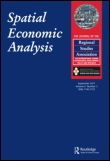
Spatial Economic Analysis
Advancing Insights into Spatial DynamicsSpatial Economic Analysis, published by Routledge Journals, Taylor & Francis Ltd, stands at the forefront of interdisciplinary research bridging economics, geography, and environmental science. With a notable impact factor reflected in its prestigious Q1 quartile rankings across key categories such as Earth and Planetary Sciences, Economics, Econometrics and Finance, and Geography, this journal is pivotal for scholars seeking to understand the intricate dynamics of spatial phenomena and their economic implications. Its comprehensive scope and rigorous peer-review process ensure that only high-quality research is disseminated, fostering innovative solutions to pressing global challenges. As of 2024, and since its inception in 2006, Spatial Economic Analysis continues to thrive as a vital platform for researchers, professionals, and students alike, facilitating access to cutting-edge studies that shape the future of spatial economics and policy.

Revista de Estudios Regionales
Connecting Scholars to Regional Realities.Revista de Estudios Regionales is a distinguished academic journal published by ASOC UNIV PUBLICAS ANDALUCIA-AUPA, focusing on various fundamental areas in the social sciences, including development, economics, sociology, and political science. Established in 1978 and converging its publication years to include recent contributions until 2024, the journal serves as a critical platform for international scholars and practitioners interested in the regional dynamics of Spain and beyond. Despite its current Q4 ranking in key categories such as Development, Economics, and Sociology, the journal aims to elevate discourse and foster a deeper understanding of regional studies, ultimately contributing to policy-making and academic dialogue. Accessible to readers without open-access provisions, this journal is a valuable resource for those seeking to engage with the latest theoretical and empirical research in the field. Scholars, graduate students, and policy professionals will find the journal’s insights particularly beneficial for advancing their work and understanding of regional phenomena.
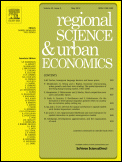
REGIONAL SCIENCE AND URBAN ECONOMICS
Empowering researchers to shape urban economic landscapes.Regional Science and Urban Economics, published by Elsevier, is a premier academic journal dedicated to advancing the understanding of spatial dynamics and urbanization. With an ISSN of 0166-0462 and E-ISSN 1879-2308, this journal has established itself as a vital resource for researchers and practitioners in economics and urban studies, boasting a remarkable impact factor and ranking in the Q1 category for both fields. Since its inception in 1975, the journal has provided a platform for high-quality research that examines both theoretical and empirical aspects of regional science and urban economics. With a Scopus rank of 47th in Urban Studies and 157th in Economics, it ensures that the latest findings reach a wide audience. Researchers interested in exploring spatial economics and urbanization trends will find this journal indispensable for staying at the forefront of their fields, facilitating collaboration and innovation in addressing contemporary urban challenges.
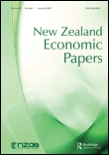
New Zealand Economic Papers
Driving impactful research for a deeper understanding of economic trends.New Zealand Economic Papers is a prominent academic journal dedicated to the field of economics, published by Taylor & Francis Ltd. With its ISSN 0077-9954 and E-ISSN 1943-4863, this journal has been a significant contributor to economic discourse since its inception in 1966, continuing to provide valuable insights through to 2024. As part of the third quartile (Q3) in the Economics, Econometrics and Finance category, it ranks at #165 out of 288 in Scopus, placing it within the 42nd percentile, demonstrating its respectable impact in the academic community. Although the journal does not offer open access, it remains a vital resource for researchers, professionals, and students interested in understanding economic dynamics, policy analysis, and applied econometrics, particularly in the context of New Zealand. The journal's commitment to rigorous research ensures that it continues to play a crucial role in shaping economic policy and academic thought across the globe.
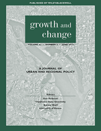
GROWTH AND CHANGE
Exploring the intersections of sustainability and development.GROWTH AND CHANGE is a prestigious academic journal published by Wiley, focusing on the interdisciplinary study of global and planetary change. Since its inception in 1970, this journal has served as a critical platform for researchers and scholars who seek to explore the complexities of social, economic, and environmental transformations occurring worldwide. With an impressive impact factor and renowned for its rigor, it currently holds a Q2 ranking in the Global and Planetary Change category as per the latest metrics. GROWTH AND CHANGE can be accessed through traditional subscriptions, catering to a broad audience including professionals and academic institutions. Its objectives revolve around advancing knowledge and fostering critical discussions that illuminate the challenges posed by rapid change and growth in our environments. Positioned at the forefront of debates in sustainability and development, this journal is indispensable for anyone vested in understanding and addressing the interconnected issues of our changing world.

PAPERS IN REGIONAL SCIENCE
Empowering knowledge in geography and environmental planning.PAPERS IN REGIONAL SCIENCE, published by Wiley, is a leading international journal dedicated to advancing the understanding of regional science and interdisciplinary approaches to geography and environmental planning. With an impressive impact factor and a prestigious Q1 ranking in both Environmental Science and Geography, Planning and Development, this journal serves as a critical platform for disseminating high-quality research from 1955 to 2024. Covering a diverse scope including regional development, spatial analysis, and environmental issues, it facilitates discussion and knowledge exchange among scholars and practitioners. The journal is recognized for its rigorous peer-review process and its commitment to addressing pressing societal challenges through research. As a vital resource for researchers, professionals, and students alike, PAPERS IN REGIONAL SCIENCE fosters innovation and collaboration within the field, contributing to a deeper understanding of the complexities of regional systems.

Regional Statistics
Unlocking Insights Through Statistical AnalysisRegional Statistics, published by the Hungarian Central Statistical Office, is a leading scholarly journal that plays a pivotal role in enhancing the understanding of regional development and statistical analysis. With its ISSN 2063-9538 and E-ISSN 2064-8243, this open-access journal contributes significantly to various fields, including Cultural Studies, Economics, Geography, and Public Administration. The journal has established itself with impressive Scopus rankings, placing it in the top percentiles across multiple categories, evidencing its high-quality research outputs. Covering converged years from 2015 to 2024, Regional Statistics publishes insightful articles that address pressing regional issues, making it an invaluable resource for researchers, professionals, and students alike who are interested in the quantitative dimensions of society. With a reputation bolstered by its Q1 and Q2 categorizations in various disciplines, this journal is not only committed to advancing statistical knowledge but also to fostering interdisciplinary dialogue among statisticians, policymakers, and social scientists.

Area Development and Policy
Shaping urban landscapes through innovative policy discourse.Area Development and Policy is a prominent open-access journal published by Routledge Journals, Taylor & Francis Ltd, focusing on significant contributions to the fields of geography, urban studies, public administration, and environmental science. Launched in 2014 and located in the United Kingdom, this journal has quickly garnered a reputation for excellence, achieving a Q1 ranking in several categories, including Geography, Planning and Development, and Nature and Landscape Conservation as of 2023. Researchers and academics benefit from its broad scope, which encompasses various dimensions of area development and policy-making, while facilitating the dissemination of cutting-edge research through its open-access format. With an exceptional Scopus ranking—particularly within Urban Studies (#32/279)—the journal serves as a crucial platform for scholars seeking to advance discourse in these fields. As it converges its focus through 2024 and beyond, Area Development and Policy continues to be an essential resource for professionals and students dedicated to understanding the complexities of regional development and the policies that shape our environments.

ANNALS OF REGIONAL SCIENCE
Fostering Interdisciplinary Dialogue on Regional IssuesThe ANNALS OF REGIONAL SCIENCE, published by SPRINGER, is a premier academic journal that has been disseminating impactful research since its establishment in 1967. With a distinguished focus on regional science, this journal serves as a vital platform for scholars, policymakers, and practitioners interested in understanding the spatial dynamics of economic and environmental phenomena. Boasting a Q1 ranking in Social Sciences and a Q2 ranking in Environmental Science, the journal effectively bridges disciplines, fostering interdisciplinary dialogue and innovation. The journal's rigorous peer-review process ensures the highest standards of academic integrity, making it a crucial resource for anyone involved in regional analysis and planning. As a testament to its global relevance, the ANNALS OF REGIONAL SCIENCE is indexed in Scopus, placing it among the top-tier journals in its field, with a commendable rank of #61 out of 275 in General Social Sciences and #100 out of 233 in General Environmental Science. Researchers, professionals, and students are encouraged to contribute to this essential body of work, as it continues to shape the discourse on regional development and environmental sustainability.